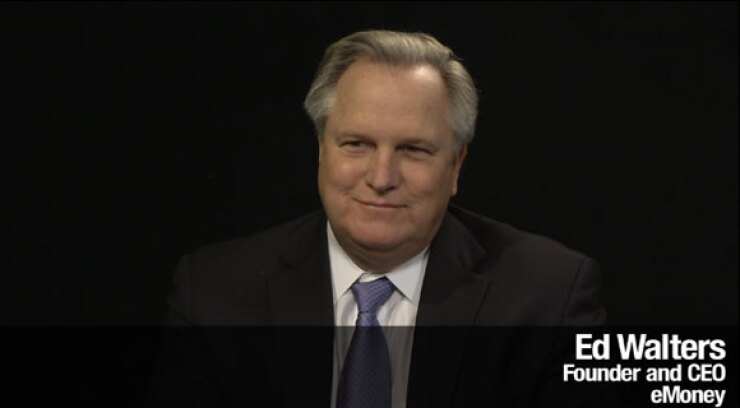
Former advisor Edmond Walters planned a party for all his employees at eMoneyAdvisor on the Friday leading into the long Labor Day weekend.
But by the time the food trucks pulled up and the competitive egg toss got underway, he was nowhere to be found.
Walters' decision to quit the firm he founded 13 years earlier right before the vacation weekend meant that everyone who worked for him somberly approached the festivities, if a company blog posted shortly before the gathering was any indication of the mood that day.
"Today, we begin the next chapter in our story with our hearts a little heavier as we process what the future will hold," the company's "Open Letter" read.
Absent the typical corporate-speak and written by the firm's communications staff, the blog declared the firm's collective grief over Walters departure as well as a commitment to fulfilling their mission as Walters defined it.
HOMESPUN TONE
They praised Walters for "his ability to work a room, to ruffle a few feathers, and his unwillingness to settle for anything short of excellence."
The 350 employees still at the firm "represent the culture he created. They represent the culture we live. And the culture we’ll keep."
That homespun tone served as an indicator that Fidelity could be making good on its promise to let eMoney operate as an independent firm and not manage away its somewhat combative, rebellious culture.
Michael Durbin, the Fidelity executive filling in for Walters as interim CEO, "loved" the letter, which nobody from Fidelity reviewed beforehand, a spokeswoman for the custodian said.
"I just thought it was just so authentic, so sincere. It was so honest. They just came out and said we are going to miss him," says Patti Brennan, a longtime eMoneyAdvisor user and president of Key Financial in West Chester, Penn., who has given input to Walters on his service for eight years now.
'LET THE eMONEY PEOPLE SPEAK'
"I think that was a smart thing to do, to let the eMoney people speak," says Bob Curtis, founder of MoneyGuidePro, which is both an eMoney competitor and a venture partner about to sign a new integration agreement with eMoney later this month.
Since Walters' abrupt departure, some of the 25,000-odd advisors who use its service to have been making inquiries of competing firms.
"I think there are people looking for alternatives," says David Benskin, a former planner and founder of eMoney competitor Wealth Access. "We are kind of the last man standing not associated with a large company."
Benskin anticipates Walters' departure to contribute to his firm's already strong growth this year. With 120 advisors who have $25 billion under management, Wealth Access is small compared to eMoney's $1.5 trillion.
It's only natural if eMoney loses some of its mojo -- for now, Curtis thinks.
"You're not going to replace Edmond," he says. "There is no 'almost-Edmond' at that firm. I would expect them to lose some of their innovation at least in the short term. They can do everything they can to ameliorate the issue, but there's nothing good about this for eMoney."
'A CAGED ANIMAL'
Brennan says she suspects Fidelity made Walters feel like "a caged animal or a bad boy … They might have been trying to say, 'Edmond, you are not just Edmond anymore, you are part of Fidelity and you represent us.'"
And while that probably didn't work for an entrepreneur who has been likened to an irrepressible "
Backed by Fidelity's huge warchest, she and others think eMoney still could become a juggernaut.
"I have experienced significant growth since I switched to eMoney seven years ago," Brennan says. "Edmond would say, 'Patti, that has to do with you,' but I'm not so sure about that. [eMoney] makes me feel very passionate about the service we give to our clients. What eMoney has done is they've given me this tool that I didn't have before."
Well-known planner Ron Carson says the eMoney product called Decision Center is allowing his firm to write many more financial plans than they used to.
"That was a game changer for us and for eMoney," Carson says.
Which is all to say that Fidelity has a lot to lose if it mismanages the company it picked up for a reported $250 million in February.
"What everyone is concerned about is that Fidelity is going to come in and do what it always does, which is make it a Fidelity company," Brennan says.
Despite the fact that she spent more than a year to transitioning her 600 clients to the eMoney platform, she wouldn't hesitate to switch to a competitor if, for example, Fidelity made itself the service's sole custodian.
'I WOULD DROP IT IN A DAY'
"If they asked me to do that I would drop it in a day," Brennan says. "I just think that is the wrong thing to do. You want to keep this an independent company. You want to let them do their thing."
Fidelity gets it, Carson thinks.
"I have full confidence that the value will continue to be there," he says, adding that Durbin called him after Walters' departure to assure him of the custodian's commitment to eMoney.
"If you look at the product and then you think about Fidelity," he says, "I think you can only come to one conclusion: That [eMoney] has got to be the safest place to be when it comes to account aggregation and client relationship management."
Read more:





